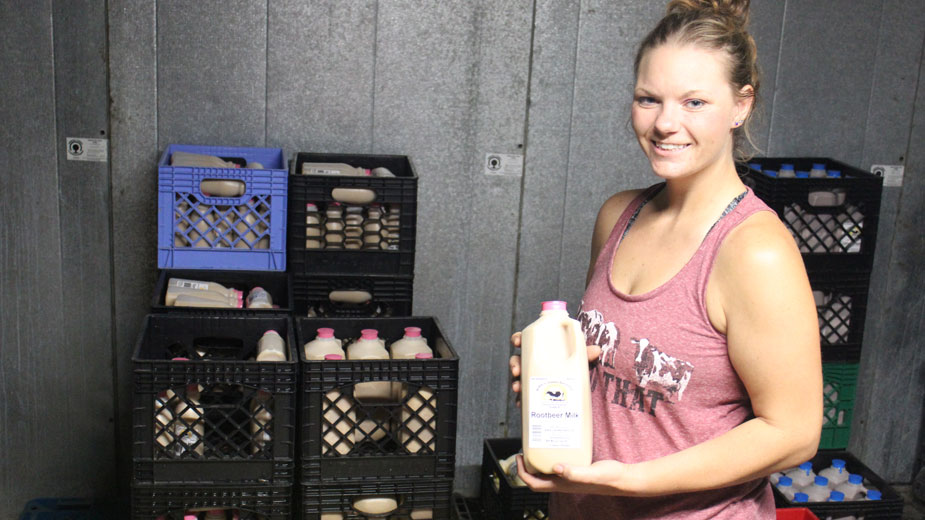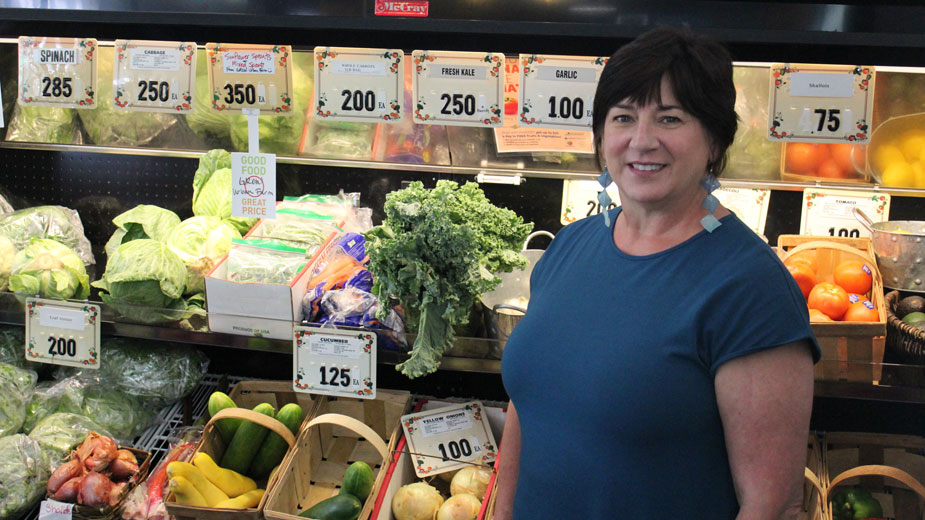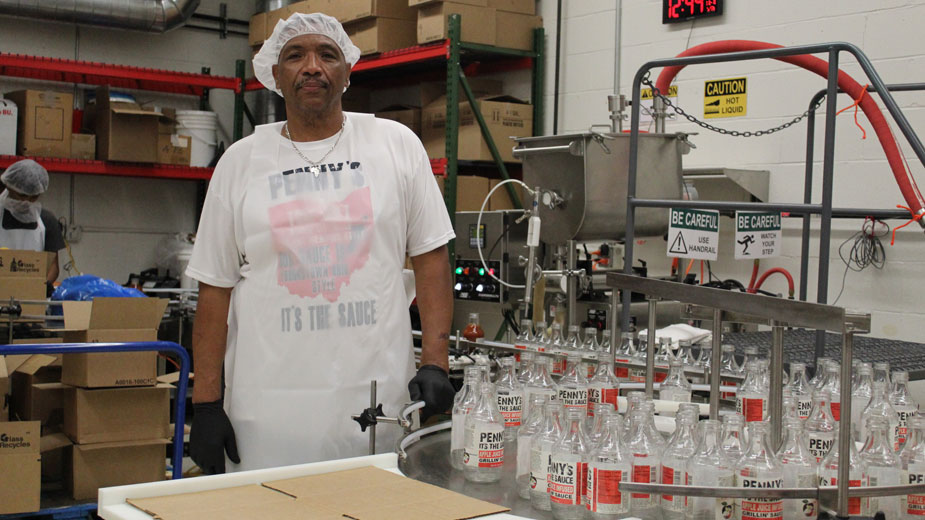Local Food Producers Make Their Way to Store Shelves
YOUNGSTOWN, Ohio – For local food producers trying to work their way into grocery stores, there’s no right answer to the question of when the right time is. Often, it’s a leap of faith and, in many cases, several leaps.
“Sometimes the products depend on the time of year; this time is big for barbecue. I’ve got people who started making sauce in the winter who, all of a sudden, have seen production go way up,” says Sean Dougherty, manager of the Common Wealth Kitchen Incubator in Youngstown. “Mr. Penny saw that last year. He had a big season but by getting into stores, he was able to keep his production up.”
Charles Penny has used the canning line at the Kitchen Incubator to bottle his Penny’s Gourmet Sauce, delivered to 18 stores in the area, with his sights set on more. Initially, Penny produced his barbecue sauce in Athens at an incubator there, during which time he sold his sauce in six stores. To enter the market, he worked with a food broker, but eventually started working on his own.
“I saw what he did and I followed the steps myself. I went to stores, met with managers and gave them samples. It started taking off and I was able to get my sauce into more stores,” Penny says.
At Baker’s Golden Dairy in New Waterford, it was a similar process, relates manager Kasey Hudson. The dairy began producing milk in 2011 and today offers flavored milk, drinkable yogurt and ice cream in some 60 stores from southern Columbiana County to the Greater Cleveland area.
“Having a small quantity and a short shelf life, we’ve had to take it step by step. To get into the first few stores, we had to go out and give samples of our products,” Hudson says. “But after that, we’ve been able to let it ride and have stores contact us to start carrying our products.”

Throughout the retail food market, competition is tight. Penny is well aware that his isn’t the only barbecue sauce on shelves. Part of the process of getting into retailers is showing that your product stands apart from what’s already there.
“Everybody and their brother wants to sell pasta sauce and hot sauce. There are only so many you can carry. There’s only so much shelf space,” says Debbie Pifer, owner of White House Fruit Farm. “We’re always on the lookout for things that are unique or trending. But neither do we pick up every local product just because it’s local.”
At the farm in Canfield, locally made food products are the second-largest segment behind only the fruits and vegetables grown in-house, she says. The market for such foods has long been around, but it’s only been in recent years that it’s garnered more attention. Since White House opened its store, she says, leadership has been on the lookout for local products to stock its shelves.
When it comes to choosing what products to put on the shelves, Pifer says she looks for two things: a price customers will find palatable and a product that fits with White House’s homemade aesthetic.
“You first have to make sure they make a quality product. We have to make sure it fits our market, that we think we can sell it,” she says. “They do lots of sampling for us and we do a big sampling weekend every year.”
On the third weekend of March, White House hosts its sampling fair, inviting customers to meet with producers and foster connections between locally made food products and the community who buys them.
“Our customers love it because it’s all the local vendors talking about their own products,” Pifer says. “Local community is everything. As a producer, you want to be somewhere where you can maximize sales.”
But before vendors can even make their way onto store shelves, there’s plenty of work that goes into preparing products for retail.
At the Kitchen Incubator, Dougherty and the Common Wealth staff work with clients to prepare the foods for market, providing connections to agencies such as the Ohio Department of Agriculture or Food and Drug Administration.
“The really big challenge is the scale-up. We can help growers and makers gain confidence in their product and know that they have a product that’s ready to go to market,” says Melissa Miller, board president of the Lake to River Food Co-op. “They get feedback, have space to do some taste-testing and it tells them their product is ready.”

The co-operative, launched by area farmers, is under the umbrella of Common Wealth and operates in conjunction with Cultivate Cafe, which sells local produce, meats and food products.
With decades of experience, Dougherty and the Kitchen Incubator staff work with tenants to help them scale. That assistance can come in the form of business lessons such as bookkeeping or seeking out funding, as well as technical assistance such as altering recipes and finding the supplies for larger quantities.
“A lot of the difference is the amounts. With Mr. Penny, he’s been getting into new stores, which means more production,” Dougherty says. “The biggest thing with that is finding the ingredients. Before, they may be going to places like Sam’s Club and buying smaller amounts, whereas we can work with purveyors like Acme and Scarpasi’s.”
Then, there’s the regulatory requirements. To first get into stores, Penny had to send his products to an FDA-certified process authority, which ensures foods have the proper makeup to be safely bottled and stored.
“[In home recipes] everything’s done in cups and teaspoons. You have to send it out to a process authority and they break it down, check the acidic levels and tell you how to cook it. They change it all to pounds,” he says. “Once you have that, you send your information to the FDA and then they tell you to cook the sauce at 185 and that jars have to be inverted to seal.”
Both Penny’s and Baker’s handle delivery in-house and for both, learning the logistics trade was part of the process.
“There’s nobody in this part of Ohio that does what we do. We went to Pennsylvania to learn some of the processes of how to make the milk, but for logistics we were on our own,” Hudson says.
Since milk and dairy products are perishable items, Baker’s has to keep a tight schedule between bottling and delivery.
“With milk, you have a 2½ week sell-by date, so things have to go through here pretty quickly,” she says, noting Baker’s ships about 1,000 gallons of milk per week. “It was a lot of trial and error, figuring out what stores would need what product.”
For companies like Penny’s Gourmet Sauce and Baker’s Golden Dairy, having products in stores is clearly a boon for them.
But it also speaks to the quality of food products in the area and the network that’s sprung up between makers.
“Local food awareness has really let people celebrate the bounty of products the Mahoning Valley has,” says the Lake to River’s Miller, “both fruit and vegetables that are seasonal and products like Baker’s Golden Dairy or value-added products that are available year-round.”
Adds White House’s Pifer: “It’s always been there. There’s always been people attempting to produce food products, but now it’s gotten so much more attention.”
Pictured:Penny’s Gourmet Sauce, created by Charles Penny, is available in 18 area stores. He has his sights set on adding more.
Copyright 2024 The Business Journal, Youngstown, Ohio.



